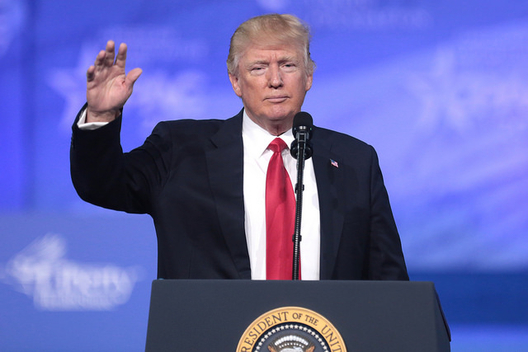 Unfair burden-sharing with our allies and inadequate investment in our own defense had invited danger from those who wish us harm….
Unfair burden-sharing with our allies and inadequate investment in our own defense had invited danger from those who wish us harm….
America’s allies are now contributing more to our common defense, strengthening even our strongest alliances. We have also continued to make clear that the United States will no longer tolerate economic aggression or unfair trading practices….
American political, business, and military leaders worked together with their counterparts in Europe and Asia to shape the post-war order through the United Nations, the Marshall Plan, the North Atlantic Treaty Organization (NATO), and other institutions designed to advance our shared interests of security , freedom, and peace. We recognize the invaluable advantages that our strong relationships with allies and partners deliver….
The United States offers partnership to those who share our aspirations for freedom and prosperity. We lead by example. “The world has its eye upon America,” Alexander Hamilton once observed. “The noble struggle we have made in the cause of liberty, has occasioned a kind of revolution in human sentiment. The influence of our example has penetrated the gloomy regions of despotism.”
We are not going to impose our values on others. Our alliances, partnerships, and coalitions are built on free will and shared interests. When the United States partners with other states, we develop policies that enable us to achieve our goals while our partners achieve theirs.
Allies and partners are a great strength of the United States. They add directly to U.S. political, economic, military, intelligence, and other capabilities. Together, the United States and our allies and partners represent well over half of the global GDP. None of our adversaries have comparable coalitions….
A strong and free Europe is of vital importance to the United States. We are bound together by our shared commitment to the principles of democracy, individual liberty and the rule of law. Together, we rebuilt Western Europe after World War II and created institutions that produced stabilty and wealth on both sides of the Atlantic. Today, Europe is one of the most prosperous regions in the world and our most significant trading partner.
Although the menace of Soviet communism is gone, new threats test our will. Russia is using subversive measures to weaken the credibility of America’s commitment to Europe, undermine transatlantic unity, and weaken European institutions and governments. With its invasions of Georgia and Ukraine, Russia demonstrated its willingness to violate the sovereignty of states in the region. Russia continues to intimidate its neighbors with threatening behavior, such as nuclear posturing and the forward deployment of offensive capabilities.
China is gaining a strategic foothold in Europe by expanding its unfair trade practices and investing in key industries, sensitive technologies, and infrastructure. Europe also faces immediate threats from violent Islamist extremists. Attacks by ISIS and other jihadist groups in Spain, France, Germany, Belgium, the United Kingdom, and other countries show that our European partners continue to face serious threats. Instability in the Middle East and Africa has triggered the movement of millions of migrants and refugees into Europe, exacerbating instability and tensions in thr region
The United States is safer when Europe is prosperous and stable, and can help defend our shared interests and ideals. The United States remains fi rmly committed to our European allies and partners. The NATO alliance of free and sovereign states is one of our great advantages over our competitors, and the United States remains committed to Article V of the Washington Treaty.
European allies and partners increase our strategic reach and provide access to forward basing and overflight rights for global operations. Together we confront shared threats. European nations are contributing thousands of troops to help fight jihadist terrorists in Afghanistan, stabilize Iraq, and fight terrorist organizations across Africa and the greater Middle East.
The NATO alliance will become stronger when all members assume greater responsibility for and pay their fair share to protect our mutual interests, sovereignty, and values.
Priority Actions
POLITICAL: The United States will deepen collaboration with our European allies and partners to confront forces threatening to undermine our common values, securty interests, and shared vision. The United States and Europe will work together to counter Russian subversion and aggression, and the threats posed by North Korea and Iran. We will continue to advance our shared principles and interests in international forums.
ECONOMIC: The United States will work with the European Union, and bilaterally with the United Kingdom and other states, to ensure fair and reciprocal trade practices and eliminate barriers to growth. We will encourage European foreign direct investment in the United States to create jobs. We will work with our allies and partners to diversify European energy sources to ensure the energy security of European countries. We will work with our partners to contest China’s unfair trade and economic practices and restrict its acquisition of sensitive technologies.
MILITARY AND SECURITY: The United States fulfills our defense responsibilities and expects others to do the same. We expect our European allies to increase defense spending to 2 percent of gross domestic product by 2024, with 20 percent of this spending devoted to increasing military capabilities. On NATO’s eastern flank we will continue to strengthen deterrence and defense, and catalyze frontline allies and partners’ efforts to better defend themselves. We will work with NATO to improve its integrated air and missile defense capabilities to counter existing and projected ballistic and cruise missile threats, particularly from Iran. We will increase counterterrorism and cybersecurity cooperation….
Image: President Donald Trump, National Harbor, Maryland, February 24, 2017 (photo: Gage Skidmore)
